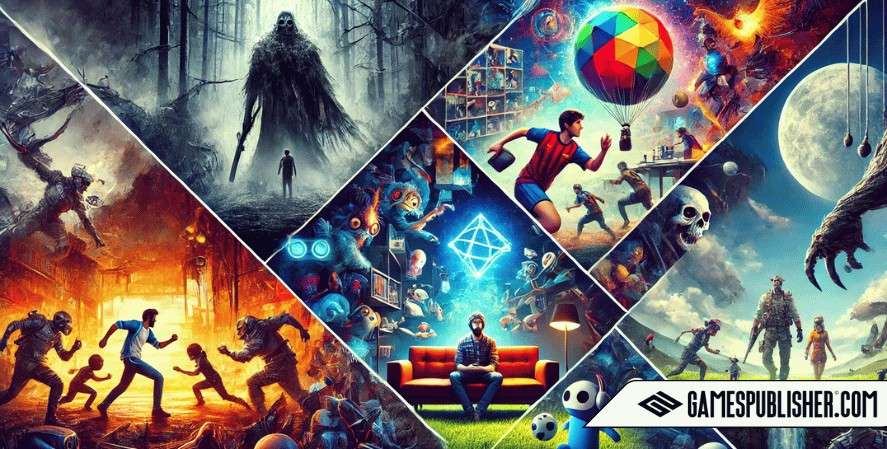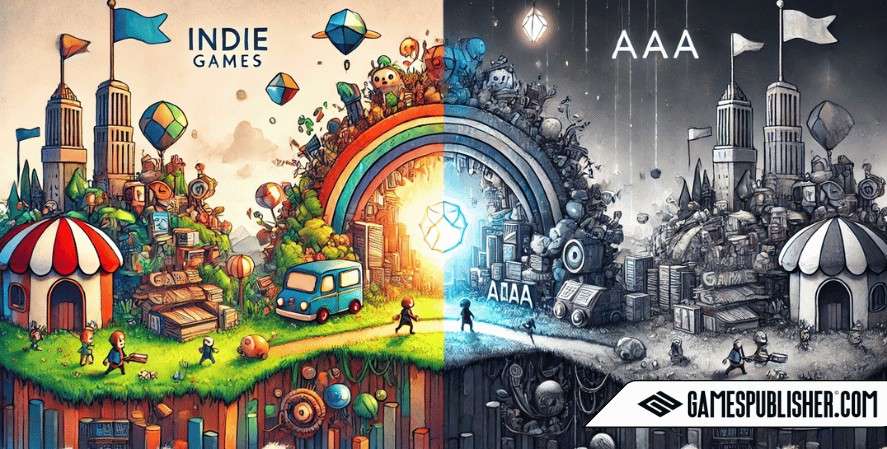The gaming industry is massive and complex, relying on partnerships between developers and game publishers to make great games available to players. But what are game publishers, and why are they so important?
If you’re curious about their role or want to learn about the best developer games and top video game publishing companies, this article is for you.
For everything about game publishing and development, check out Gamespublisher.com. Whether you’re a developer, gamer, or industry expert, understanding game publishers can help you navigate the gaming world.
What Is a game Publisher?

Game publishers are companies that handle the business side of games. They manage funding, marketing, distribution, and post-launch support. This lets developers focus on creating the games.
What Do Game Publishers Do?
- Provide Funding: Publishers invest money so developers can make the games.
- Market Games: They promote games using ads, trailers, and social media.
- Distribute Games: They get games on platforms like consoles, PC, and mobile stores.
- Support After Launch: Publishers help keep games updated and fix issues after release.
game Developers vs. game Publishers
It’s important to understand the difference between developers and publishers.
- Developers create the games. For example, Naughty Dog made The Last of Us.
- Publishers fund, market, and distribute games. Sony Interactive Entertainment published The Last of Us.
Some companies do both. Square Enix, for instance, creates and publishes its games, like Final Fantasy. Indie studios often need independent game publishers, such as Annapurna Interactive, to help them get their games to market.
Types of Game Publishers
There are many types of publishers, each focusing on specific platforms, game styles, or markets. Here are the main types:
1. Publishers of Mobile Games
Mobile publishers focus on games for iOS and Android. These are often free-to-play games with in-game purchases.
- Examples: Tencent Games (PUBG Mobile), Supercell (Clash of Clans), Zynga (Words with Friends).
- Key Features: Regular updates, user retention, and microtransactions.
2. Publishers of AAA Games
AAA publishers focus on high-budget games designed to become blockbusters.
- Examples: Electronic Arts (FIFA), Ubisoft (Assassin’s Creed), Activision Blizzard (Call of Duty).
- Key Features: Big budgets, large teams, and extensive marketing.
3. Publishers of Indie Games
Indie publishers help smaller studios bring their unique ideas to life.
- Examples: Devolver Digital (Hotline Miami), Annapurna Interactive (Outer Wilds).
- Key Features: Creative freedom and niche markets.
4. Publishers of PC Games
PC publishers specialize in games for computers. They often distribute their titles through platforms like Steam or the Epic Games Store.
- Examples: Paradox Interactive (Cities: Skylines), Sega (Total War).
- Key Features: Strategy games and mod-friendly titles.
5. Publishers of Console Games
Console publishers create games tied to specific gaming systems, like PlayStation or Xbox.
- Examples: Sony Interactive Entertainment (God of War), Microsoft (Halo), Nintendo (The Legend of Zelda).
- Key Features: Exclusive titles to boost console sales.
6. Publishers of VR Games
VR publishers create games for virtual reality platforms like Meta Quest or HTC Vive.
- Examples: Meta (Beat Saber), Survios (The Walking Dead: Onslaught).
- Key Features: Immersive worlds and cutting-edge gameplay.
7. Esports-Focused Publishers
These publishers make games designed for competitive gaming.
- Examples: Riot Games (League of Legends), Blizzard Entertainment (Overwatch).
- Key Features: Multiplayer gameplay and long-term engagement.
8. Mobile Indie Game Publishers
These publishers combine indie creativity with the accessibility of mobile platforms.
- Examples: Raw Fury (Kingdom), TinyBuild (Hello Neighbor).
- Key Features: Unique gameplay and smaller budgets.
The Role of Game Publishers

Game publishers are essential for turning ideas into playable games. Here’s what they do:
1. Funding Game Development
Making games can be expensive. Publishers provide the money that developers need to bring their projects to life.
2. Marketing and Branding
Good marketing ensures that a game reaches its audience. Publishers use ads, social media, and events to promote games.
3. Distribution
Publishers handle the technical and logistical work of getting games onto platforms like PC, consoles, and mobile stores.
4. Post-Launch Maintenance
Games often need updates to fix bugs or add new content. Publishers make sure this happens smoothly.
Why Are Publishers Important?
Gamepublishers are vital for the gaming industry for several reasons:
- Support for Developers: They let developers focus on creativity while handling business needs.
- Global Reach: Publishers make games available to audiences worldwide.
- Innovation: They fund new ideas that might otherwise never get made.
List of Renowned Game Publishers
Here are some of the top video game publishing companies and their most famous titles:
- Electronic Arts (EA): FIFA, The Sims, Apex Legends.
- Activision Blizzard: Call of Duty, Diablo, Overwatch.
- Nintendo: Animal Crossing, Mario Kart, Pokémon.
- Sony Interactive Entertainment: God of War, Uncharted, Horizon Zero Dawn.
- Microsoft (Xbox Game Studios): Halo, Forza, Minecraft.
- Tencent Games: PUBG Mobile, Honor of Kings.
- Devolver Digital: Fall Guys, Hotline Miami.
- Square Enix: Final Fantasy, Tomb Raider.
- Annapurna Interactive: Stray, Outer Wilds.
Indie Game Publishers vs. AAA Game Publishers

When choosing a publisher, it’s important to understand the differences between indie and AAA publishers:
- Indie Publishers: Focus on creativity and niche audiences but have smaller budgets.
- AAA Publishers: Offer big budgets and global reach but may limit creative control.
How to Choose the Right Game Publisher
If you’re a developer, here’s how to find the right publisher:
- Look at Their Portfolio: Check what games they’ve published and how successful they were.
- Match Your Genre: Make sure the publisher understands your type of game.
- Check the Contract: Be clear about revenue splits and creative control.
- Assess Distribution Strength: Choose a publisher with strong global reach.
Conclusion
Game publishers are the backbone of the gaming industry. They make it possible for developers to focus on creativity while ensuring games are marketed and distributed to players. Whether you’re learning about the video game publishing industry or partnering with independent game publishers, knowing their roles and specialties is key.
For more insights, visit Gamespublisher.com and explore everything about game publishing and development!
Loading survey...

